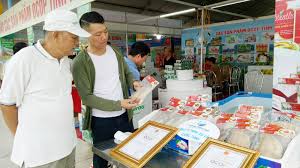
(HBO) – The one commune-one product (OCOP) programme, which has been underway in Hoa Binh, has created a motivation for the growth of agriculture, rural areas and farmers. Strengthening the implementation of the programme is an effective measure to develop products at communal and district levels, while enhancing the efficiency of the new-style rural area building programme, helping transform the economic structure of the locality as well as income and living conditions of locals.
Fillets of "Lang” fish farmed in Da River produced by Cuong Thinh company in Hoa Binh city is rated as a four-star OCOP product at provincial level.
The objective and major contents of the OCOP programme is to develop local products making use of advantages in natural resources, culture and labour in rural areas with the involvement of the community.
The provincial People’s Committee has approved the OCOP programme in Hoa Binh in the 2019-2020 period with the vision to 2030. The locality aims to standardize at least 25 percent of local agricultural products (about 50 products), while building 10-15 culture-tourism villages.
The locality will also focus on diversifying and processing products in value chains, completing production organization towards closer connection between farmers, cooperatives and enterprises.
The province will reinforce and complete about 50 economic organizations and set up at least 10 economic organizations to engage in the OCOP programme. It will build a system of showrooms and shops to introduce OCOP products in localities with good conditions for trade and tourism.
As part of efforts to implement the OCOP programme in 2019, the provincial People’s Committee has spent 8.33 billion VND, sourced from the budget of the National Target Programme on New-Style Rural Area Building, to carry out activities including opening training courses on new-style rural area building and OCOP programme, producing OCOP model products, reviewing and building goods distribution systems as well as OCOP product introduction and selling centres across the province, and holding trade promotion conferences to connect with businesses and build selling channels for OCOP products.
Districts and cities have verified, evaluated and ranked the products at district and city levels and chosen products for a contest at provincial level.
So far, 24 products by 18 producers in groups of food, beverage, herbal medicine and garment and textile have been certified and labeled as OCOP products with its rating stated in the labels. Of the products, eight have been rated as four stars and 16 received three stars.
In order to enhance the efficiency of trade promotion activities, the provincial OCOP coordination office has cooperated with relevant agencies to introduce OCOP products at trade fairs in the province and the region as well as supermarkets in Hanoi.
Nguyen Van Dung, Vice Chairman of the provincial People’s Committee said that the OCOP programme is an important solution for the restructuring and development of agricultural production, optimizing the creativity and brainpower of people, and building a sustainable economic connectivity./.
According to data from the Hoa Binh Provincial Party Committee, the industrial production index for the first six months of 2025 is estimated to have increased by 20% compared to the same period last year. This marks the highest year-on-year growth rate for this period since 2020.
In the first six months of 2025, Hoa Binh province’s export turnover was estimated at 1.145 billion USD, marking an 18.11% increase compared to the same period in 2024. Import turnover was estimated at $ 804 million, a 17.15% increase, which helped the province maintain a positive trade balance.
The lives of the ethnic minority farmers in Tan Lac district have gradually improved thanks to the new directions in agricultural production. This is a testament to the collective strength fostered through the professional associations and groups implemented by various levels of the district’s Farmers’ Union.
With the motto the "product quality comes first,” after nearly one year of establishment and operation, Muong village’s Clean Food Agricultural and Commercial Cooperative, located in Cau Hamlet, Hung Son Commune (Kim Boi district), has launched reputable, high-quality agricultural products to the market that are well-received by consumers. The products such as Muong village’s pork sausage, salt-cured chicken, and salt-cured pork hocks have gradually carved out a place in the market and they are on the path to obtaining the OCOP certification.
In the past, the phrase "bumper harvest, rock-bottom prices" was a familiar refrain for Vietnamese farmers engaged in fragmented, small-scale agriculture. But today, a new spirit is emerging across rural areas of Hoa Binh province - one of collaboration, organisation, and collective economic models that provide a stable foundation for production.
Maintaining growing area codes and packing facility codes in accordance with regulations is a mandatory requirement for agricultural products to be eligible for export. Recently, the Department of Agriculture and Environment of Hoa Binh province has intensified technical supervision of designated farming areas and packing facilities to safeguard the "green passport" that enables its products to access international markets.



